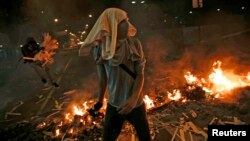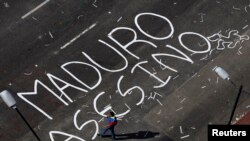CARACAS —
Venezuela's jailed protest leader urged supporters on Friday to keep demonstrating peacefully against President Nicolas Maduro despite violence that has killed six people and rocked the OPEC member nation.
“I'm fine, I ask you not to give up, I won't,” Leopoldo Lopez said to his followers in a handwritten note passed to his wife at Caracas' Ramo Verde prison then posted on the Internet.
The 42-year-old Lopez, a Harvard-educated economist and one of Venezuelan independence hero Simon Bolivar's few surviving relatives, spearheaded protests against the socialist government that began at the start of February.
But he surrendered to the military this week after an arrest warrant was issued accusing him of instigating the violence.
Six people have died, five from gunshots, and one run over by a vehicle, as the protests have degenerated into violence in Caracas and other cities around Venezuela, especially in the western Andean region.
More than 100 people have been injured.
Both sides are blaming each other for murder and brutality.
The government says sharpshooters are appearing on the opposition side and radicals are seeking to create chaos by smashing property, attacking police and blocking highways.
The protesters, mainly students, accuse Maduro of worsening repression. They say police are firing shots, allowing pro-government gangs to attack the protesters and mistreating some detainees.
“To the police, soldiers, prosecutors and judges: do not obey unjust orders, do not become the face of repression,” Lopez said in his note from prison.
“To the youth, to the protesters, I ask you to stay firm against violence, and to stay organized and disciplined. This is everyone's struggle.”
Once again, the worst trouble on Friday appeared to be in the western border town of San Cristobal, which residents are calling a “war zone” with running battles between students and security forces on barricaded streets for days.
Military operation
Venezuela's military has moved into the town in force, residents say, with helicopters and planes flying overhead. Interior Minister Miguel Rodriguez Torres is personally leading the operation there.
There was also trouble in Merida, another Andean town, and protesters blocked a few streets again in Caracas on Friday.
In the biggest challenge to Maduro's 10-month-old government, the protesters are demanding his resignation over Venezuela's rampant crime, inflation, shortages of basic products and alleged repression of opponents.
Demonstrators bang pots and pans from windows every night.
“I recommend they buy some stainless steel pots to last for a good 10, 20, 30 or 40 years,” Maduro mocked them late on Thursday. “Because the revolution is here for a long time!”
Maduro says the protests are a pretext for a planned coup, similar to the short-lived ouster of his predecessor, Hugo Chavez, in 2002.
There is no evidence the military, which was the decisive factor in 2002, may turn on Maduro now.
Henrique Capriles, another opposition leader, dismissed the claim that the protesters were planning to overthrow the government through force. “Civilians don't carry out coups, it's the military who do coups.”
Maduro, a 51-year-old former bus driver and union activist, won the presidential election last April. About nine people, most of them government supporters, were killed then in post-election violence when the opposition disputed the result.
The nation of 29 million people is split down the middle between “Chavistas”, as Maduro's supporters are still known after their idol who died of cancer last year, and opponents.
Given Venezuela's leadership of a Latin American leftist alliance from Cuba to Bolivia, and the fact it has the world's largest oil reserves, the international ramifications are big.
The unrest “threatens to further erode stability and human rights in an already polarized nation facing acute economic crisis and where the homicide rate is one of the highest on earth,” the International Crisis Group think-tank said in the latest expression of concern over Venezuela from abroad.
Local TV channels are providing almost no live coverage of the unrest, so Venezuelans are turning to social media to swap information and images. Falsified photos are also circulating.
While the Caracas protests began in middle-class neighborhoods and are still strongest there, sporadic demonstrations have also spread to poorer areas.
“I'm fine, I ask you not to give up, I won't,” Leopoldo Lopez said to his followers in a handwritten note passed to his wife at Caracas' Ramo Verde prison then posted on the Internet.
The 42-year-old Lopez, a Harvard-educated economist and one of Venezuelan independence hero Simon Bolivar's few surviving relatives, spearheaded protests against the socialist government that began at the start of February.
But he surrendered to the military this week after an arrest warrant was issued accusing him of instigating the violence.
Six people have died, five from gunshots, and one run over by a vehicle, as the protests have degenerated into violence in Caracas and other cities around Venezuela, especially in the western Andean region.
More than 100 people have been injured.
Both sides are blaming each other for murder and brutality.
The government says sharpshooters are appearing on the opposition side and radicals are seeking to create chaos by smashing property, attacking police and blocking highways.
The protesters, mainly students, accuse Maduro of worsening repression. They say police are firing shots, allowing pro-government gangs to attack the protesters and mistreating some detainees.
“To the police, soldiers, prosecutors and judges: do not obey unjust orders, do not become the face of repression,” Lopez said in his note from prison.
“To the youth, to the protesters, I ask you to stay firm against violence, and to stay organized and disciplined. This is everyone's struggle.”
Once again, the worst trouble on Friday appeared to be in the western border town of San Cristobal, which residents are calling a “war zone” with running battles between students and security forces on barricaded streets for days.
Military operation
Venezuela's military has moved into the town in force, residents say, with helicopters and planes flying overhead. Interior Minister Miguel Rodriguez Torres is personally leading the operation there.
There was also trouble in Merida, another Andean town, and protesters blocked a few streets again in Caracas on Friday.
In the biggest challenge to Maduro's 10-month-old government, the protesters are demanding his resignation over Venezuela's rampant crime, inflation, shortages of basic products and alleged repression of opponents.
Demonstrators bang pots and pans from windows every night.
“I recommend they buy some stainless steel pots to last for a good 10, 20, 30 or 40 years,” Maduro mocked them late on Thursday. “Because the revolution is here for a long time!”
Maduro says the protests are a pretext for a planned coup, similar to the short-lived ouster of his predecessor, Hugo Chavez, in 2002.
There is no evidence the military, which was the decisive factor in 2002, may turn on Maduro now.
Henrique Capriles, another opposition leader, dismissed the claim that the protesters were planning to overthrow the government through force. “Civilians don't carry out coups, it's the military who do coups.”
Maduro, a 51-year-old former bus driver and union activist, won the presidential election last April. About nine people, most of them government supporters, were killed then in post-election violence when the opposition disputed the result.
The nation of 29 million people is split down the middle between “Chavistas”, as Maduro's supporters are still known after their idol who died of cancer last year, and opponents.
Given Venezuela's leadership of a Latin American leftist alliance from Cuba to Bolivia, and the fact it has the world's largest oil reserves, the international ramifications are big.
The unrest “threatens to further erode stability and human rights in an already polarized nation facing acute economic crisis and where the homicide rate is one of the highest on earth,” the International Crisis Group think-tank said in the latest expression of concern over Venezuela from abroad.
Local TV channels are providing almost no live coverage of the unrest, so Venezuelans are turning to social media to swap information and images. Falsified photos are also circulating.
While the Caracas protests began in middle-class neighborhoods and are still strongest there, sporadic demonstrations have also spread to poorer areas.












